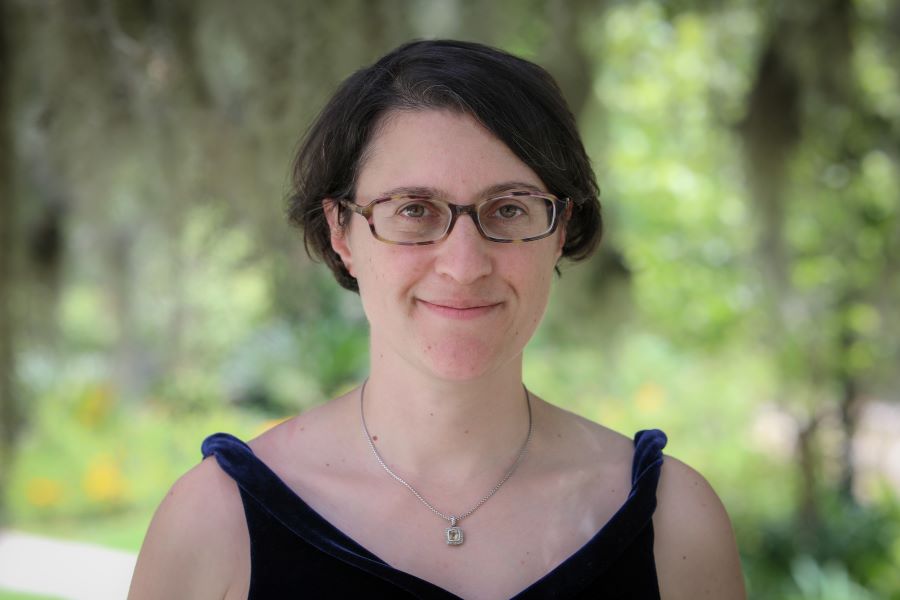Faculty Spotlight: Rachel Yohay

Rachel Yohay is an associate professor in the Department of Physics at Florida State University, part of the College of Arts and Sciences. Yohay earned her doctoral degree from the University of Virginia in 2012, then transitioned to work as a postdoctoral scholar at University of California – Davis until 2016 when she joined FSU’s faculty. Her research interests lie in experimental high energy physics.
Tell us a little about your background and what brought you to FSU.
After earning my doctoral degree, I lived in Geneva, Switzerland, until 2016 while working as a postdoctoral scholar for University of California – Davis and collaborating with the European Organization for Nuclear Research. In the fall of 2015, I applied for faculty and national laboratory positions in the U.S. and Canada. FSU made me a great offer, and I came onboard in August 2016.
Can you break down your areas of academic interest for us?
I’m interested in high energy physics, specifically collider physics. High energy particle accelerators such as the Large Hadron Collider, a machine built by the European Organization for Nuclear Research, smash protons together at nearly the speed of light. When this happens, the parts inside a proton, called quarks and gluons, interact and can create new fundamental particles. Inside a particle accelerator, these collision points are surrounded by detectors that record the most interesting collision events.
My research involves analyzing data collected by the Compact Muon Solenoid within the Large Hadron Collider to identify the presence of new particles that behave similarly to but are less massive than the Higgs boson, the fundamental particle associated with the Higgs field that gives mass to other fundamental particles such as electrons and quarks in physics. A boson is a particle that carries a force, and the Higgs mechanism explains the origins of mass in particles. Mass is not an intrinsic property of a particle, but rather is generated through interaction with the Higgs boson.
What makes you passionate about your topics of research?
It’s thrilling to know I’m investigating the most fundamental laws of physics. The Standard Model is a theory in my field that describes three of four known fundamental forces in the universe and classifies all known elementary particles. It’s well tested and makes predictions for many kinds of experiments, so any replicable, statistically significant deviation from it is a big deal. Additionally, the detectors we develop and operate push the frontiers of precision in harsh operating conditions, mainly exposure to extreme radiation. It’s a joy to make these systems work.
What do you want the public to know about your research? Why are your topics important?
My research aims to answer some of the most basic physics-related questions one could ask: What explains the masses of elementary particles? What is the nature of dark matter? If those answers are accessible during the current generation of experiments, we can learn something that will alter today’s textbooks. If not, the mysteries of the Standard Model will continue to deepen and force us to be even more clever in the next generation of experiments.
What is your favorite part of your job? What is the most challenging part of your job?
Research, by definition, involves solving problems to learn something new. Oftentimes, smaller problems must be solved in order to solve the bigger problems. My favorite part of my job is working with students and postdoctoral scholars to solve those small and intermediate problems. After doing so, the solutions to larger problems within my research such as “How will we design this new detector to work in high radiation?” seem to emerge out of thin air.
The most challenging part of my job is prioritizing. At any time, there are dozens of things I could be working on, and they all contribute in some way to my research or educational mission. My most challenging task is how to pick which direction to move in my work each day.
What is your best memory so far from working at FSU?
My best memory so far was being part of the hooding ceremony for my first doctoral graduate. He did great research, and I felt proud to have coached him through his degree.
Do you have any exciting upcoming projects or goals you’re working towards?
My team and I have agreed to partake in a two-year production of custom silicon sensors for an upgrade of the Compact Muon Solenoid calorimeter, an object used to measure the energies of relativistic charged and neutral hadrons, electrons, and photons. A representative sample of around 500 sensors will be checked at my lab for detailed quality control measurements. Once validated, these sensors will go to my colleagues at partner institutions to be packaged into detector modules that will eventually be assembled into the new calorimeter. This is a new type of calorimeter that has never been built at this scale. I’m excited to play a role in ensuring the highest quality detector performance and studying how these sensors perform when investigating high energy particles.
What do you like to do in your free time?
I have two kids under five. What free time? When I’m not at work or doing various mom things, I like to bake, cheer on the New York Mets and the Milwaukee Bucks, listen to podcasts, and socialize with friends.
If your students only learned one thing from you (of course, hopefully they learn much more than that) what would you hope it to be?
No matter how big or small the scientific question is, the way to answer it is largely the same: Create a hypothesis for what is expected to happen when quantity X is changed, decide how to change quantity X, check that quantity X was indeed changed, and decide if your hypothesis was correct. This works for everything from debugging small hardware or software problems to deciding how to structure a data analysis. It might even work in personal and family life, too.
